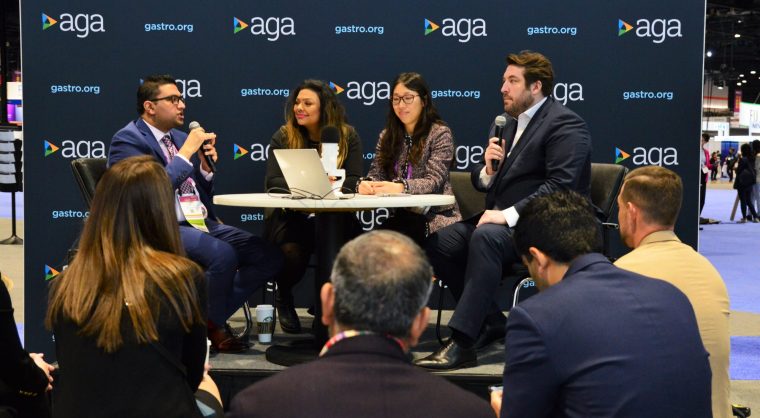Small Talk, Big Topics podcast hosts Drs. Matthew Whitson, Nina Nandy and CS Tse host a special live episode of the podcast from Digestive Disease Week® in Chicago with guest Dr. Mohammad Bilal, assistant professor of medicine and an advanced endoscopist and gastroenterologist at the University of Minnesota. They discuss how to navigate this massive medical meeting, and offer advice about how to create connections.
To kick off the episode, the hosts and Dr. Bilal all share their experiences attending DDW for the first time. Dr. Bilal’s first DDW was when he was a second-year internal resident and presenting a poster. He was the only person presenting a poster in his residency and only two people visited his poster the whole day. He spoke to one person for an extended period of time and then realized he worked for a pharma company. Dr. Nandy shares that her first meeting was in 2016 in San Diego when she was a second-year GI fellow. She was not allowed to present and had to stay back while others attended, but she remembers feeling how overwhelming and huge it was. Dr. Tse also attended as a second-year resident to present a research paper, which also felt overwhelming. Dr. Whitson presented a poster as a medical student, and he actually spoke to an author of a paper that he read in preparation for the poster presentation. He remembers feeling so excited!
Next, they discuss how they structure DDW and their advice for others. First, it is a huge meeting and hard to navigate, but approach the meeting with a goal about what to accomplish. Think about what you want your career path to look like, and then structure your time around sessions to help you achieve that goal. Dr. Bilal starts by sharing that if you are presenting, you need to prepare well because you never know who will come to see your poster. There will be lots of opportunities to learn, but definitely go to the AGA postgraduate course because it is meant for you and you can get lots of tips from that. You also want to think about geographically where you want to go for a fellowship, and then see and interact with those fellows. Also consider what resources you don’t have in your program. Seek those out and connect with other residents and fellows from other programs. Dr. Tse approaches DDW meetings differently now as a first year junior faculty since she now has meetings ahead of time. Now, she is able to talk to people about prospective programs and advice outside of sessions. It feels more balanced now, but she also recommends attending the AGA postgraduate course. While Dr. Nandy does private practice, she says the DDW is a great way to collaborate with people she normally doesn’t see. Dr. Whitson advises everyone to go to one session that is just interesting and has nothing to do with your normal world.
In addition, they all unpack how to network at DDW. Dr. Bilal starts off by saying to make sure whoever you want to talk to is not in a rush because you won’t get the response you’re looking for and you could be disappointed. He says to make it easy for those to want to network with you, such as asking to walk with them to the next session or standing with them while they’re waiting for an Uber. Dr. Whitson says to reach out to people, find a colleague in common and email them to meet for coffee. Dr. Tse recommends targeted networking, including going to the sessions or poster presentations for the people you want to meet. Dr. Nandy also recommends sending an email ahead of time to collaborate with new people.
Balancing old connections with new ones is a task that becomes more difficult as you progress in your career. However, in each phase of your career, your goals might change. If you are committed to colleagues or friends, you will make time for them. Dr. Bilal advises DDW first timers to make the meetings fun! The hosts also advise attendees to prioritize the people that you don’t see every day because those are the ones you want to connect with. When you’re meeting new people, it improves the lives of everyone around you because you can bring those educators and experiences to your institution to make your community better.
Lastly, they discuss how to follow up with connections after DDW. Dr. Bilal suggests not reaching out the same day, but to give it a week. The first meeting is just the introduction but how you follow up is where your real interest actually starts. If you say you’re going to get back with someone who’s more senior than you, then you definitely need to reach out to them, but have a clear objective for the follow up. You also need to make it easy for people to mentor and sponsor you, so include the attachments and make everything convenient for them. Know your goal for networking, which will help determine what will happen. He also suggests reaching out to 10 people or more, because then you are more likely to receive a response back.
The taping concludes with questions and answers with the live audience.
Connect with this episode's guest:
Follow Dr. Mohammad Bilal on Twitter.













